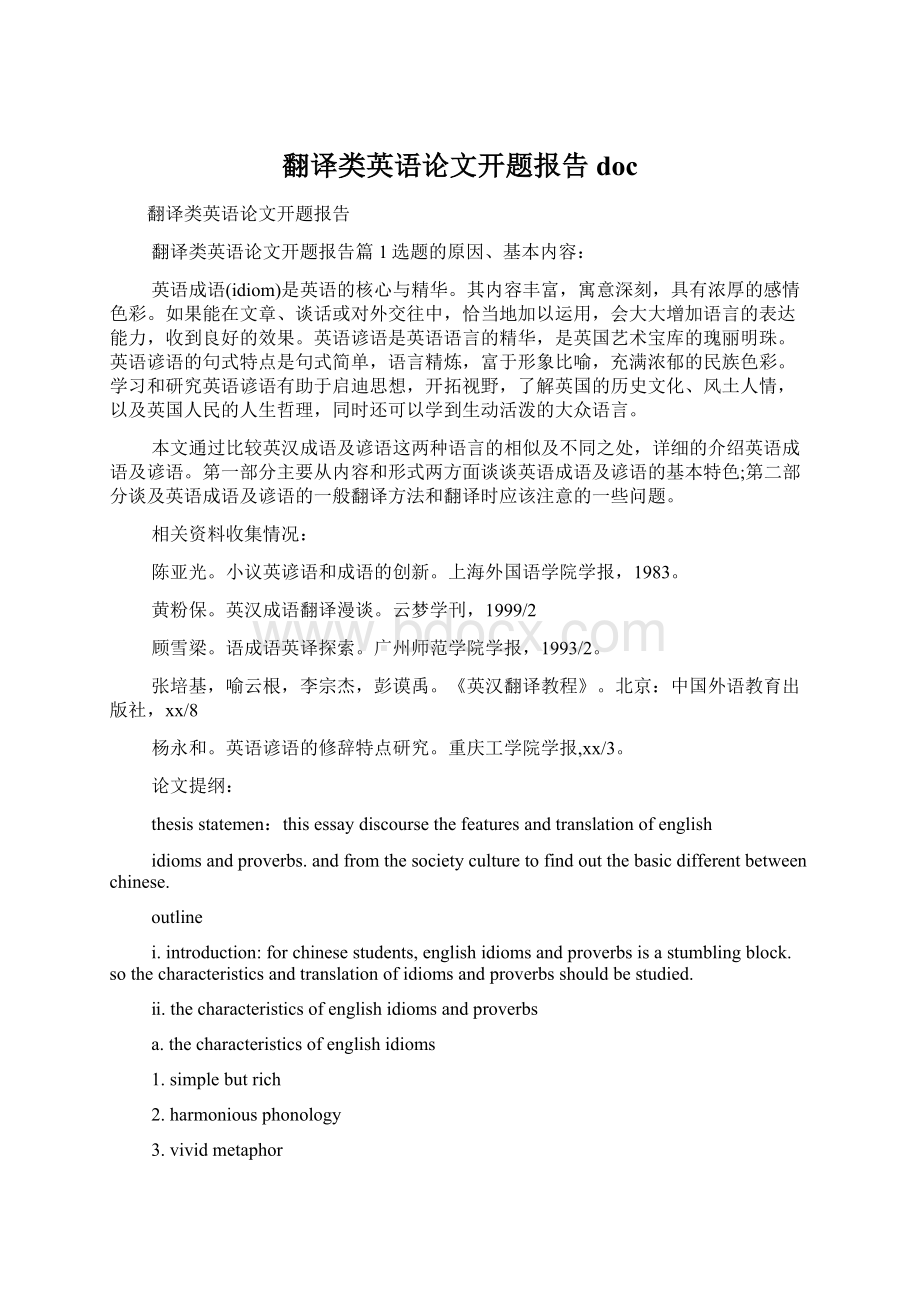翻译类英语论文开题报告docWord格式.docx
《翻译类英语论文开题报告docWord格式.docx》由会员分享,可在线阅读,更多相关《翻译类英语论文开题报告docWord格式.docx(6页珍藏版)》请在冰豆网上搜索。

学习和研究英语谚语有助于启迪思想,开拓视野,了解英国的历史文化、风土人情,以及英国人民的人生哲理,同时还可以学到生动活泼的大众语言。
本文通过比较英汉成语及谚语这两种语言的相似及不同之处,详细的介绍英语成语及谚语。
第一部分主要从内容和形式两方面谈谈英语成语及谚语的基本特色;
第二部分谈及英语成语及谚语的一般翻译方法和翻译时应该注意的一些问题。
相关资料收集情况:
陈亚光。
小议英谚语和成语的创新。
上海外国语学院学报,1983。
黄粉保。
英汉成语翻译漫谈。
云梦学刊,1999/2
顾雪梁。
语成语英译探索。
广州师范学院学报,1993/2。
张培基,喻云根,李宗杰,彭谟禹。
《英汉翻译教程》。
北京:
中国外语教育出版社,xx/8
杨永和。
英语谚语的修辞特点研究。
重庆工学院学报,xx/3。
论文提纲:
thesisstatemen:
thisessaydiscoursethefeaturesandtranslationofenglish
idiomsandproverbs.andfromthesocietyculturetofindoutthebasicdifferentbetweenchinese.
outline
ⅰ.introduction:
forchinesestudents,englishidiomsandproverbsisastumblingblock.sothecharacteristicsandtranslationofidiomsandproverbsshouldbestudied.
ⅱ.thecharacteristicsofenglishidiomsandproverbs
a.thecharacteristicsofenglishidioms
1.simplebutrich
2.harmoniousphonology
3.vividmetaphor
b.thecharacteristicsofenglishproverb
1.conciseandclear
2.symmetricalsentencepattern
3.richandvariedrhetoric
ⅲ.thetranslationofenglishidiomsandproverbs
a.thetheoriesoftranslation
1.literaltranslation
2.freetranslation
3.mechanicalapplicationofthesynonymchineseproverb
4.literaltranslationandfreetranslation
b.thepointsoftranslation
1.theliteraltranslationofproverbsprohibited
2.thetranslationofproverbstokeeptheoriginaltextstyle
3.thetranslationofproverbstonoticethenationalcharacteristic
4.thetranslationofproverbstonoticetheartisticcharacteristic
ⅳ.conclusion
指导教师意见:
指导教师签名:
年月日
翻译类英语论文开题报告篇2HowtoDealwithEllipsisinEnglish-ChineseTranslation
I.PurposeandSignificance
Withthedevelopmentofglobalization,theworldspolitical,economicandculturalcommunicationsarebecomingincreasinglyfrequent.Therefore,theroleoftranslationcannotbeignored.However,thedifferencesbetweenEnglishandChineseculturesthatarereflectedinthetwolanguagesposeconsiderabledifficulty.
Itisacknowledgedthatwhendoingtranslationonecannottranslatewordforword,orsentencebysentence.Therefore,wemustusesometranslationstrategiessuchasamplification,ellipsis,conversionandsoon.EllipsisasoneofthebasictranslationmethodsplaysanessentialroleinEnglish-Chineserendition.Translatorsapplyitinordertomaketheirversionsmorecoherentandunderstandable.
AccordingtotheOxfordAdvancedLearnersEnglish-ChineseDictionary,ellipsismeansleavingoutawordorwordsfromasentencedeliberately,whenthemeaningcanbeunderstoodwithoutthem.Ellipsisintranslationdoesnotmeancuttingsomecontentfromtheoriginalarticles.Whatcouldbeomittedarewordsthatareuselessintranslatedworksorelsetheywillmaketheversionsredundantordisobeythemannerofexpressioninanotherlanguage.
SomewordsandphrasesareuselessinChinesebutnecessaryinEnglish.ArticlesinEnglisharethemostsignificantphenomenonfromthisaspect.TheyareveryimportantinEnglish,butwecanhardlyseeanyreflectionofthispartinChinese.Ellipsisisdesignedonthebasisoffaithfulnesstotheoriginaltext,makingitmorefluent,smooth,concise,thusconformingtoidiomaticChinese.ThepaperwillexploreellipsisinEnglish-Chinesetranslationfromfiveaspects,whichareellipsesofpronouns,conjunctions,articles,prepositions,modifications,soastoachievesmootherandclearercommunicationsamongChinaandEnglish-speakingcountries.
II.LiteratureReview
Longbefore,somepeoplebegantolearnothercountrieslanguagestounderstandotherscultures.InChina,XuanzangwasthefirsttranslatorwhonotonlytranslatedtheSanskritsutrasintoChinese,butintroducedthefirstChinesewritingstoforeigncountries,makingforeignersunderstandChinasancientculture.Meanwhile,hewasthefirsttotranslateLaoTsesworksintoSanskrit.IndianscholarshadahighopinionofXuanzang,InChina,thereisnosuchgreattranslator,andalsointhehumanculturalhistory,wecanonlysaythatXuanzangisthefirstgreattranslator.(YeLang,2008)WecansaythatitwasXuanzangwhomotivatedpeopletoknowthedifferentpartsoftheworld,theirculturesandthepeopleswholivethere.Then,somebigcountriessuchasAmerica,China,andsoonbecameameltingpot.(GuZhengkun,2000)Peoplehaveimperceptiblyspentthousandsofyearsinknowingeachother.
WithChinasentryintoWTOanditsopen-uppolicy,cross-culturalexchangesareincreasinglyfrequentbetweenthiscountryandothers.AlotofforeigntouristscometovisitChina.Whiletraveling,theseforeignersarenotsatisfiedwiththetranslationsofthescenicspots.Sometimes,theyevenfeelconfused.Alotofproblemsexistinthetranslation,suchasmisuseofwords,poorexpressionofmeaningandsoon.Allofthesepoortranslationsdoharmtoourcountrysinternationalimage,andcausealotofinconveniencesfortheforeignvisitors.(MaZuyi,2000).Iamfondoftourismandbeingafreetouristliketheotherswhoaregoodatenjoyingtheirwonderfullives.Theloveoftourismmakesmefeeltheneedtoimprovethetranslation.ButeverytimewhenIhaveatrip,manyunsuitabletranslationsofthenamesofthosescenicspotswillembarrassme.Tourismispartofinterculturalcommunication,sopropertranslationofthescenicspotsbecomemoreandmoreimportanttoourcountry.
Communicationplaysasignificantroleintheglobalizedsociety.Inordertoknoweachotherbetter,peoplefromallovertheworldhavetriedaverityofways.Ofcourse,translationisoneofthem.Alltranslatorshavedonetheirbesttomakethetranslatedworksmoreconsistentwiththeneedsofpeople.(GuJinming,1997)Frommyperspective,theyreallyhavedoneagreatjob.AndIwanttoretrospectthecauseoftheirdevelopment.Afterathoroughevaluation,IchooseabranchoftranslationellipsisintranslationfromEnglishtoChinese,thenIdidthefollowingjobs.
Iputallmyresearchesandotherstuffstogether,andthenIfoundthatitisacommoncaseinEnglishandChinesewhichdrawsmuchacademicinterest.In1976,HallidayandHsanclassifiedellipsisintonominal,verbalandclausalellipsis.Thisclassificationexertsgreatinfluenceinacademiccircle.Thereafter,ellipsisinChineseandEnglishhasbeenstudiedaccordingtothistheory,whichisbasedondifferentlayersofstructure.ThiskindofstudyunderlinesdifferentiationsandsimilaritiesofellipsisinChineseandEnglish.
AnotherfamoustheorytoexplainellipsisisEconomyPrinciple.EconomyPrinciplewasputforwardbyChomsky(1991,1993,and1995)inhisGenerateCrammer.ItmaintainsthatlanguageandlinguisticstudyfollowEconomyPrinciple,whichmeansusingtheleastefforttoexpressthemostinformation.Thisprinciplejustcoincideswithellipsisinfunction.
Inthisthesis,Ithinkthatbrevityisthemostobviousandcommonfunctionofellipsis,especiallyindailylanguage.AndinbothEnglishandChinese,peopleadvocatebrevity.Shakespeareonceremarked,brevityisthesoulofwit,andinChinesetherearenumerousidiomslikeyanjianyigai(meaningcompendious).However,apartfromthefunctionofbrevity,ellipsisembodiesotherfunctionswhicharealsoprettycommoninthetwolanguagesbutlessnoticed.(HuaXianfa,2002)ThesefunctionsdistributeinbothEnglishandChineseunevenlyandrepresentgreatcolorfulnessoflanguage.ExploringotherfunctionsofellipsisandsearchingforfunctionalrecreationintranslationwillbeofmuchbenefittobothEnglishtoChineseandChinesetoEnglishtranslation.
IfoundthatwhenChineseauthorstrytoanalyseellipsisinEnglishtoChinesetranslation,theyalwaysinitiallyputarticlesinthelist.TheyconsiderthatitisacommonphenomenonthatChinesealwaysleaveoutpersonalarticles.WhileitisobviouslydifferentinEnglishthatalmosteverysentencehasasubject,wecanseearticlesfluently.ThatisbecausewhenwetranslatefromEnglishtoChinese,personalarticlescanbeomitted,eventhoughsometimesitmayappearonce,itcanalsobeomittedifnecessary.Furthermore,iftheobjectscanbeseenobviously,personalarticlesshouldalsobeomitted.However,itneverhappensinEnglish.Fromthispoint,itisnotonlyallowablebutalsonecessarywhenwetranslatepersonalarticleswhichareobjectsinsentencesintoChinese.
Inmypointofview,thedevelopmentofsocietyhasinsomewayhasdeliberatelypromotedthewayofpeoplesthinking,translationsystemhasbecomemoreandmoreperfect,peoplefromallovertheworldhaveenjoyedtheconvenience.However,wecannotneglectthattherearestillsomeproblemsinthisfieldinChina,andwehavelessinfluentialChinesetranslatorsintheworld.Therefore,westillhavealongwaytogointranslation.
III.FeasibilityAnalysis
Thisacademicpaperisafeasibleprojectandthereasonsareasfollows:
1.IhavegreatinterestsinthewayofEnglish-Chinesetranslation.
2.Ihavealreadystudiedtranslationmethodsandhavebeenfamiliarwiththefunctionsandapplicationsofellipsis.
3.IhavecollectedenoughreferencesbothChineseandWesternonellipsisin
translationanddoascrupulousstudyoftherelationshipbetweenthem.
4.Ihaveacarefullyplannedscheduleandhaveworkedoutadetailedoutlineofthisthesis.
5.Ihaveacquaintedmyselfwiththecorrectformat,aclearandcompletestructurerequiredbytheacademicpaper,andmyadequateEnglishcompetencewillenablemetowriteinfluentandpreciseEnglish.
6.Myinstructorisaqualifiedtranslatorwhoisfamiliarwit